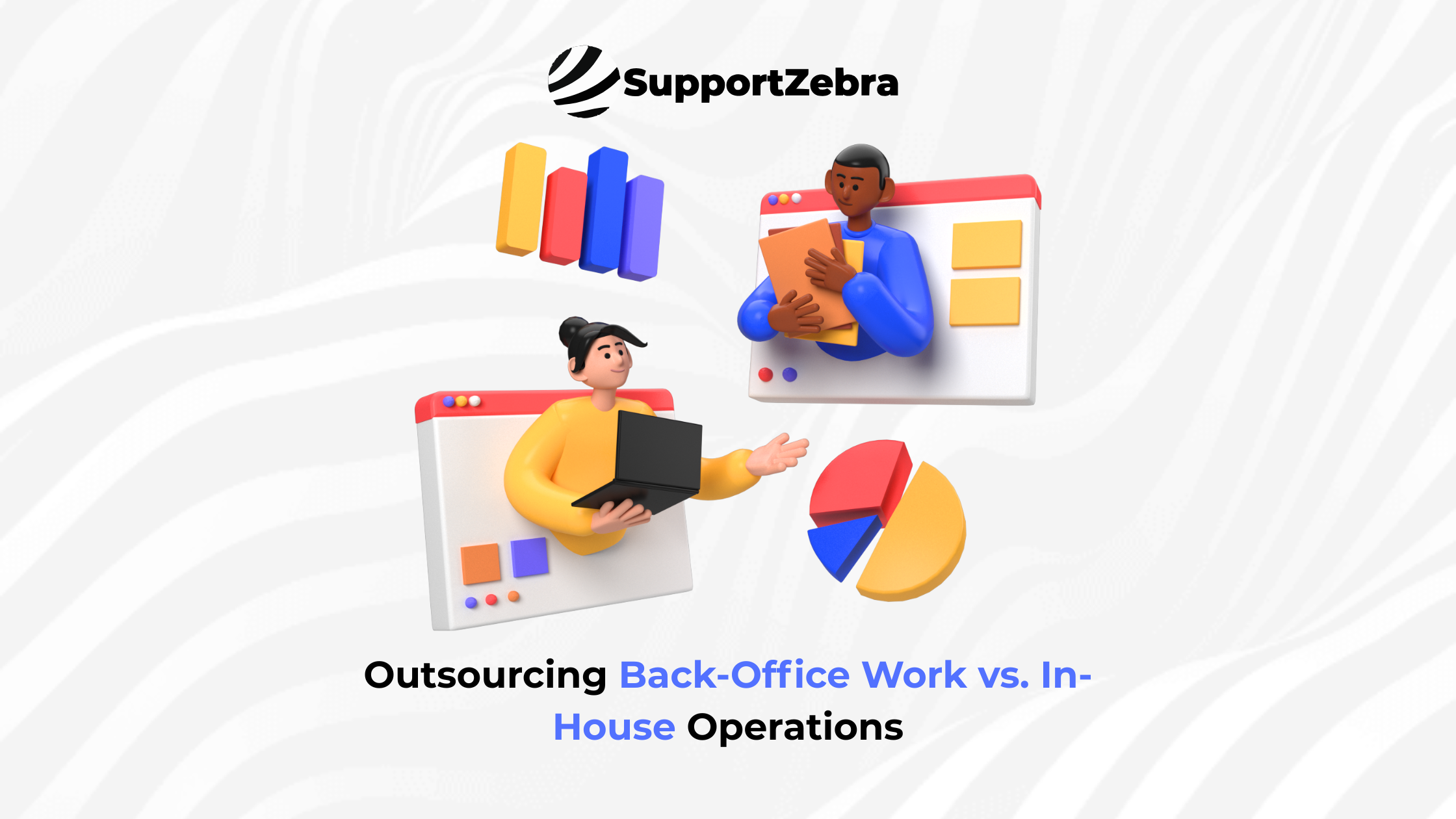Outsourcing vs In-House Which One Is Draining Your Budget
- Outsourcing back-office work reduces costs, boosts efficiency, and gives businesses access to specialised expertise.
- In-house operations offer greater control, stronger team cohesion, and enhanced data security.
- Both models impact profits and efficiency differently, making it crucial to align the choice with business goals.
- SupportZebra helps companies cut costs by up to 50% while streamlining back-office tasks for long-term growth.
What are the actual costs of outsourcing back-office tasks versus keeping them in-house? This issue is increasingly relevant for businesses aiming to enhance efficiency and reduce expenses. Understanding the financial implications of both options is crucial for making informed strategic decisions.
In this blog, we will explore the pros and cons of outsourcing versus in-house management, focusing on their impact on profits and overall organizational effectiveness.
What is Back-Office Outsourcing?
Back-office outsourcing is a strategic approach where companies hire external experts to handle tasks they typically manage, allowing them to focus on their core strengths. Common areas for outsourcing include IT services, customer support, human resources, and financial tasks like payroll and bookkeeping.
Benefits of Outsourcing Back-Office Work
- Cost Reduction
Outsourcing lowers labor costs and overhead by allowing businesses to pay for services only as needed rather than maintaining a full-time staff.
- Access to Expert Skills
Companies gain specialized knowledge and advanced technologies from providers, enhancing operational efficiency.
- Greater Focus on Core Activities
Outsourcing non-core tasks enables businesses to concentrate resources on strategic projects that drive growth and innovation.
- Flexibility and Scalability
Outsourcing allows companies to adjust operations based on demand, providing flexibility in resource management and quicker market responses.
- Enhanced Efficiency
Third-party providers often have more efficient processes, leading to faster turnaround times and improved service quality compared to in-house operations.
Industries Using Back-Office Operations
Back-office functions are crucial in various industries, each with specific needs. Here’s how outsourcing these responsibilities can benefit your business:
SaaS (Software as a Service)
Efficient back-office operations are essential for effective service delivery and customer satisfaction in the SaaS industry. They are vital for subscription renewals, reducing churn, and managing financial health. Flawless execution of these tasks is crucial for success in a rapidly changing digital landscape. Key operations include:
- Customer Support: Provide users with quick assistance to encourage renewals.
- Subscription Management: Streamline billing and account management.
- Compliance: Follow data regulations like GDPR.
- Financial Management: Oversee cash flow and revenue reporting tailored for SaaS.
eCommerce
Effective management of online sales is crucial for eCommerce success. Behind-the-scenes tasks are vital for ensuring a smooth shopping experience, directly impacting customer satisfaction, loyalty, and overall business success.
- Inventory Management: Avoid stock shortages with precise tracking.
- Order Fulfillment: Handle shipping, returns, and logistics smoothly.
- Customer Service: Respond to inquiries quickly for a better shopping experience.
- Payment Processing: Ensure secure transactions and prevent fraud.
FinTech
In the FinTech industry, tech-driven back-office functions are vital for automating financial services and managing risks. Adhering to strict regulations ensures smooth operations, allowing companies to deliver innovative services while maintaining security and compliance.
- Regulatory Compliance: Understand and navigate complex financial regulations.
- Risk Management: Reduce financial risks to maintain trust.
- Transaction Processing: Ensure secure and accurate financial transactions.
- Data Security: Safeguard against cyber threats while using data for growth.
Regardless of your industry, optimizing back-office functions leads to greater efficiency, compliance, and customer satisfaction, propelling your business forward.
What are In-House Back-Office Operations?
In-house back-office operations involve a company’s team managing administrative tasks like human resources, accounting, IT support, and compliance. This approach allows for better control and oversight of processes and data.
Advantages of In-House Back Office Work
- Direct Control
In-house operations enable better oversight of staff and processes, leading to quicker decision-making and enhanced efficiency. - Team Cohesion
Working in the exact location fosters collaboration and communication, strengthening relationships and a unified purpose. - Security and Confidentiality
Keeping back-office tasks internal allows for robust security measures, reduces the risk of data breaches, and ensures compliance with privacy laws. - Personalized Solutions
In-house teams can develop tailored systems that meet the organization’s needs, improving overall performance. - Enhanced Understanding of Business Operations
Internal employees possess a deeper understanding of the company’s culture and objectives, allowing them to align their work with strategic goals.
How Can SupportZebra Transform Your Back-Office Operations?
At SupportZebra, we pride ourselves on being a leading provider of back-office outsourcing services designed to enhance your business processes. Partnering with us can reduce your customer payroll costs by up to 50% and streamline administrative tasks, allowing your teams to focus on growth.
We offer tailored services like data entry, digitization, database management, content creation, and e-commerce support. Our strategic approach cuts HR costs and provides customized dashboards and reporting tools for valuable performance insights, particularly in the SaaS and e-commerce sectors.
Choosing SupportZebra means transforming your back-office operations into a strategic advantage that fosters growth and long-term success. Contact us today to align your objectives with our expertise and efficiency.

